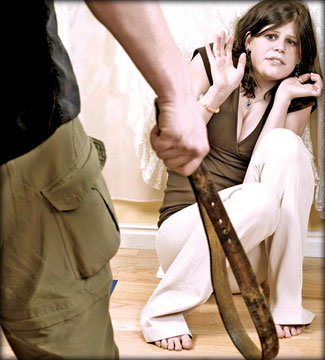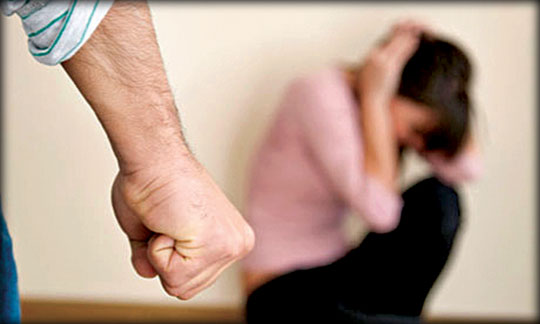Rescuing women living in a brutal society
By Carol Aloysius
Lankan women are currently facing an escalation in brutal violence
committed within the four walls of their homes. Whether it is marital
rape, or emotional violence the sheer brutality of such violence has
been so horrific, that it has prompted calls from the media, women
activists, and non government organisations working for victims of
domestic violence, as well as political leaders to call a halt to this
surging wave of violence.
 The victims of domestic violence are not confined to a single
community, society, or district. They are spread across the country,
from North to South, East to West, rural to urban. The perpetrators are
not strangers to them. The majority are husbands, partners, in-laws and
other close relatives. The causes may range from trivial to something
more serious. The result; violent savage assaults on hapless women who
cannot fight back. The victims of domestic violence are not confined to a single
community, society, or district. They are spread across the country,
from North to South, East to West, rural to urban. The perpetrators are
not strangers to them. The majority are husbands, partners, in-laws and
other close relatives. The causes may range from trivial to something
more serious. The result; violent savage assaults on hapless women who
cannot fight back.
Domestic violence is not a new phenomenon in this country. What is
new and more frightening today, is that it has taken a more brutal form.
As it continues with impunity, and the number of victims have risen
significantly, what is disturbing is that only a few support centres are
available to respond to the cries for help by these hapless women in
their hour of need.
One of them is Women-in Need (WIN). This pioneer organisation created
for this purpose in the mid 1980s, has been in the forefront of
providing shelter, a half way home among other requirements to help
women who have suffered from domestic violence.
The call for help comes at any time, says WIN lawyer and activist
Sumithra Fernando. “A knock at the door of one of our crisis centres at
midnight immediately alerts our counselling team of the urgency of the
caller’s need for help, since few women in our society would venture out
alone at that hour of the night unescorted.
Many of thee midnight callers would have found our address and run
away from home without their husband’s knowledge to seek our help. So no
sooner we hear them knock at our door our trained counsellors would be
ready to welcome them and give them temporary shelter if needed in one
of our half way houses”.
Last year, WIN had approximately 60,000 women (accompanied by
children in some cases) calling at the doors of their nine crisis
centres islandwide at different times of the day and night. “They were
mostly victims of violence perpetrated on them by their husbands or
partners,” says Fernando.
What shocks and horrifies even long experienced
counsellors/volunteers is the extent of the brutality inflicted on these
unfortunate women.
“There are signs of the severity of their wounds all over their
bodies when they arrive at one of our centres”, say WIN sources. “Some
have deep slashes on their faces, necks, hands, and legs. Others arrive
with faces burned by a flaming log or even an iron by their husbands.
Still others have been almost blinded by chilli powder thrown on them,
while some have had acid thrown at them. If the wounds are serious, we
usually take them to a state hospital to be treated. Since we now have a
Counselling Desk at some of the hospitals, the women are thereafter
counselled at these desks by our officers, and even given legal advice
if they need it.”
Causes
The causes for such violence are complex. “They could vary from the
very trivial to the more serious.”, says Fernando. A woman could have
her face burned simply because she asked her husband for more
housekeeping money, or her neck injured over a difference of opinion
with regard to their child’s school. A woman who delays in offering her
husband a hot lunch or tea the moment he demands it, can end up with hot
water thrown at her.
“The sad thing is that all that violence could have been prevented if
the husband and wife had sat down and discussed their issues in an
amicable manner”, Fernando laments. “Unfortunately we still live in a
male dominated society with husbands holding the reins on the domestic
front no matter how educated his wife is, or how successful a career she
has.
This imbalance of power between the two genders could be a
contributory factor, although other factors like alcoholism must also be
taken into account”. No matter what the causes are, she insists that no
one should condone violence as a means to resolve a family dispute.
Although WIN and the few other centres that help such women are
currently doing their best to help these battered women, it is clearly
just not enough.
“The state must take on that responsibility. It should provide these
women with the kind of support they require and protect them from
violence in the future”, she says.
Surveys
Despite the fact that violence against women is escalating rapidly,
and Sri Lanka now has a Domestic Violence Act in place from 2005, the
irony is that no national level survey on domestic violence has still
been conducted.
So from where do those who quote various statistics on domestic crime
on public platforms get their facts and figures? we asked another
women’s organisation involved in research on women. According to those
sources, they were based on mostly micro studies done at community,
district and provincial level. These studies however were limited and
the statistics were too varied to be hundred percent accurate.
To cite some examples: In the most recent study (2010) by Jayatilleke
et al it was found that 36 percent wives between 15 and 49 years had
experienced at least one episode of personal or sexual abuse during
their lifetime, and 19 percent during the past 12 months. A WHO multi
country study found the prevalence rate of domestic violence in Sri
Lanka to be between 15 percent to 70 percent.
We asked lawyer and women’s activist, Shyamala Gomez who has dealt
extensive with this issue for her comments.
“As you see these figures vary. Besides, some of them are targeted to
specific groups of women such as pregnant women or women in the estate
sector etc. Likewise the causes too can vary,” she said.
So what has brought on this rise in male aggression against women in
general? Did it have something to do with the macho culture of our
society?
 Ms Gomes’s reply was “To some extent violence against women could be
due to the fact that we still live in a patriarchal society where the
husband holds the reins firmly on the domestic front. The fact that
women are prepared to accept that subservient role also shows their
passive acceptance to their subservient roles,” she said. Ms Gomes’s reply was “To some extent violence against women could be
due to the fact that we still live in a patriarchal society where the
husband holds the reins firmly on the domestic front. The fact that
women are prepared to accept that subservient role also shows their
passive acceptance to their subservient roles,” she said.
However, the growing violence may also indicate something more beyond
that much touted excuse for male aggression.
“It may be a fall out of violence from the 30 year war against
terrorism. That war did not affect just one region or one community. It
affected the whole nation. All of us suffered from violence and that
violent culture is probably still affecting us as the war has only just
ended.” Other factors such as alcoholism and drug usage could also be
related causes, she says.
Another significant reason could be the unhealthy example set by some
of our own political leaders who also beat up their wives and continue
to do so with impunity because no one stops them. “Those who look upto
them may want to emulate them. Or feel that they too can get away with
anything because the politicians do so”, she says.
Support
So what do women who have suffered from brutal attacks on them by
their own husbands, really need to stop this aggression?
“They need sustainable support structures which we sadly lack at
present. They need proper trained counsellors who are committed to
helping them. They also need many more crisis centres and half way homes
able to look after them and even provide daycare facilities for their
children if needed. They require alternative choices if they wish to
separate from their husbands such as life skills training. So they can
become self employed and not need to depend on financial help from their
husbands.”
The police too need to take the whole issue of domestic violence more
seriously, she says. “At present it is trivialised by the Police and
even the Courts of law. For example, all Magisterial Courts have the
power to give protection orders to safeguard women abused by domestic
conflicts from further harm. But not all of them do so. So we need (the
media and everyone else) to make them aware of this fact. We also need a
change of attitudes among our menfolk. Existing laws can also be given
more teeth.”
All that can be achieved to some extent if the state were to extend
its fullest co-operation to helping these women, she says. “The state
can play a key role if not the main role in taking on the responsibility
of providing these women with shelters, half way homes, training in
skills, daycare centres, and a whole lot more to make their lives
better”, she says, echoing some of the sentiments of her colleague
Sumithra Fernando.
What if the state refuses to take on that responsibility?
“Then the laws enacted to stop domestic violence will not be
implemented properly. Those victims will not be able to move forward.
And violence in general against women will continue indefinitely.
I only hope there will be more political commitment for improving
these women’s plight, and most importantly that men’s attitude towards
women will also change”, she says. When Women’s International Day falls
next month, hopefully the fate of domestic violence will not be
sidelined so that those who have been battered by husbands can live in
hope again. |

